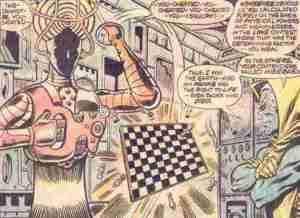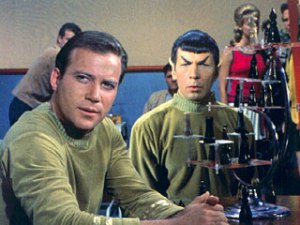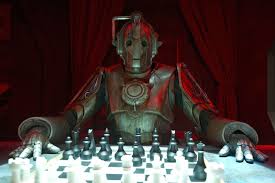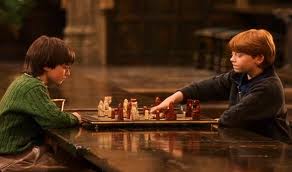David Levy won the Scottish Chess Championship in 1968 and then wagered the world no computer could beat him. “The idea of an electronic world champion,” he boasted, “belongs only in the pages of a science fiction book.”
The machines rallied against him, but Chaos, Ribbit, MacHack, even the Soviets’ reigning computer champ, Kaissa, were no match for a human mind. When Levy defeated Northwestern University’s Chess 4.7 (he’d beat 4.5 the year before), he declared: “my opponent in this match was very, very much stronger than I had thought possible when I started the bet. Now nothing would surprise me (very much).”
Levy upped the bet with a $1,000. Omni Magazine threw in another $4,000 , and Deep Thought scooped it up in 1989. When Garry Kasparov faced the upgrade Deep Blue, Levy predicted the grandmaster would sweep the match 6-0. “I’m positive,” said Levy, “I’d stake my life on it.”
Kasparov won 4-2, then lost the rematch to the first electronic world champion. Kasparov likened the computer’s countermoves to the hand of God: “I met something that I couldn’t explain. People turn to religion to explain things like that.”
In Terminator mythology, this is how the world ends. Boot up the chess-playing Turk and a few inevitable moves later Skynet is nuking the planet. But back in 1968, chess was still just a game. Dr. Doom responded to Levy’s challenge with Prime Mover, a program that used agents of S.H.I.E.L.D. as pawns. When Doom moved onto other nefarious activities, the bored Prime Mover rocketed out of Doom’s Latverian castle to seek players in outer space. Grandmaster, a God-like “galactic gambling addict,” responded for a three-game match in Giant-Size Defenders No. 3 (which I plucked off of a rotating, 7-Eleven comic stand when I was nine).
“Data-analysis-indicates-you-will-be-defeated,” boasts the machine.
“Your analysis is in error then, my worthy opponent,” Grandmaster retorts.
“Negative. I-am-the-Prime-Mover. Error-is-impossible. All-probability-permutations-E/M/G-Earth-Mastery-Game-cross-checked. In-each-you-lose.”
Oh, that’s right, they’re playing for—what else?—world domination. Prime Mover promised each of his alien chessmen a “governorship of some sector of the earth,” while Grandmaster wants a “permanent stable of gladiators” selectively bred from Earth’s superpowered heroes.
The crew of the starship Enterprise faced a similar fate against some other galactic gambling addicts in 1968 too. The Gamesters of Triskelion were just glowing colored brains on tiny pedestals, but they couldn’t resist Kirk’s winner-take-all wager. Combatants fought with Vulcan lirpas, but all those three-dimensional chess games Kirk played against Spock must have helped too.
In fact, Gene Roddenberry wrote his writing staff a 1968 memo demanding even more chess: “Let’s also get back to more of the colorful aspects of our Vulcan. For example — the continuing joke of his chess games with Kirk in which Spock invariably loses because of Kirk’s humanly illogical moves. Spock guesses correctly what Kirk should do but Kirk invariably makes a ‘wrong’ move which defeats Spock.”
Roddenberry’s game analysis reveals two things: 1) the creator of Star Trek didn’t play much chess, and 2) emotionless logic scares people. Every third episode, Kirk destroys a planet-enslaving supercomputer, usually by revealing its illogic and so causing it to self-destruct. Prime Mover fares no better when the Grandmaster’s Defenders win 2 of their 3 matches.
“This-cannot-be. You-cheated-you-cheated-you-cheated-you-SQUORK-”
Prime Mover knocks over the chessboard, final evidence of humanly illogical emotion conquering even a machine “programmed never lo lose.”
According to Dr. Who lore, Time Lords invented chess, but when the Doctor plays a game against the upgraded Cybermen, emotion is his weakness too. Will he save his companions (those nefarious robots have linked their lives to each playing piece) or obey the dictates of inhuman logic and sacrifice individual lives to win the larger game? Spock always sides with logic and loses, but Neil Gaiman (he wrote the episode “Nightmare in Silver”) knows more about chess than Roddenberry. The sentimental Doctor has only one choice.
He cheats.
But Ron Weasley doesn’t have that option in the first Harry Potter novel. He, Hermione, and Harry take the places of “a knight, a bishop, and a castle” in order to cross a life-sized chessboard. When a piece is lost, its opponent “smashed him to the floor and dragged him off the board, where he lay quite still, facedown” (which is slightly better than being smashed to pebbles in the film version). Eventually Ron relies on his inner Spock-like inhumanness to win: “it’s the only way . . . I’ve got to be taken.”
“NO!” Harry and Hermione shouted.
“That’s chess!” snapped Ron. “You’ve got to make some sacrifices!”
It’s a hard lesson to learn. My son is upstairs right now scribbling inside the booklet of chess puzzles his tutor assigned him. Most require some sort of counter-intuitive sacrifice, a large piece in exchange for not a piece of greater or even equal value but a game-winning position. Chess legend Paul Morphy designed one of the most famous puzzles when he was ten. Cameron wears it on a t-shirt. If you let go of your emotional attachment to your rook, your piddly little pawn will step up and win the game.
Cameron asked for lessons after winning his fifth K-8 chess tournament. His first teacher was a young guy and former national scholastic champ who focused on openings. His current is white-bearded and (Cameron noted) prefers endgames. When my wife dropped Cameron off for his first lesson, she wasn’t sure she should leave her son in such an eccentrically unkempt house, down such an isolated, wooded side road, with a stranger whose social awkwardness could be inching toward serial killer.
He and Cam hit it off fine. Chess was their bridge, the social glue. Cam’s sax teacher recommended the guy—which also explained the otherwise creepily long fingernails. He plays classical guitar. Add mathematics and hieroglyphics to his areas of expertise, and you’ve got a contender for world champ of reclusive super-geniuses.
Did Roddenberry fear all those world-dominating supercomputers for the same reasons? When he rebooted Star Trek for Next Generation, he replaced his Vulcan with an android. Geniuses are “evil” because all that computer-like intellect must require some counter-intuitive sacrifice, a pummeling of their wrong-headed but human-hearted errors. Terminator premiered during the mid-80s techno craze, when even the eminently analog Neil Young and Jethro Tull sacrificed their signature sounds for the robotic lure of drum machines and vocoders. It was like Skynet had already won.
Cameron’s chess coach wants him to think like a machine too. He should process chess patterns like his mother’s face, he says. You don’t consciously analyze features until deducing an overall identity. Looking and recognizing are simultaneous. The simile (Mom = checkmate) may sound a bit Vulcan, but the idea is true of any learned skills. Reading these word patterns requires no conscious effort either.
But I’m terrible at chess patterns. Chess Titans, the program that came with the laptop I’m typing on, tells me I’ve won only 32% of the Level 5 games I’ve played against it. My stats halved to 15% and then 8% when I ventured higher. Apparently Kasparov and his cronies have developed “anti-computer” tactics to deal with such Prime Movers, but my human illogic loses again and again. Perhaps a purely logical creature would click down to Level 4 and reap a 64% success rate. But my dogged humanity keeps me plugging away.
Humans are gluttons for punishment. We can’t help it. We’re addicts for hard-won lessons. Meanwhile, one Ron Weasley on mechanical horseback can still pummel me to pebbles. Cameron can too. But not consistently. Our current human grandmasters are holding their Skynet offspring at a draw too. The highly human Magnus Carlson (he’s twenty-two and models shirtless in fashion magazines) won the World Championship last week. His “unpredictable style of play,” one ad brags, “embodies the spirit of unconventional thinking.” And that’s all it takes to save humanity.
&bsp;





Chess is SCARY!!!
http://badforyoubook.com/chess-mess/
Chris, for the ultimate SF/chess novel read John Brunner’s ‘The Squares of the City’.
Didn’t Kirk and Spock play 3D chess? I tried that once and my brain exploded.
Also, of course:
http://sciencefiction.com/wp-content/uploads/2012/04/Justice_League_of_America_Vol_1_1.jpg
“But back in 1968, chess was still just a game. Dr. Doom responded to Levy’s challenge with Prime Mover, a program that used agents of S.H.I.E.L.D. as pawns.”
Actually that was a complete and utter ass-pull ending to a story that had gone on for something like eight issues, an extremely long time in 1968. Fury destroys the Yellow Claw, and in a single final panel the whole Prime-Mover-and-Doom business is revealed. Even as a kid I felt it was a cheat. (Admittedly that final panel’s a double-page spread, and the Prime Mover is both eerie and op-art in design.)
Don’t forget Vonnegut’s 1951 story “All the King’s Horses” where soulness communism stands in for heartless machine logic.
AB, I just ordered the Brunner novel for my son. He’s going to love it.
Joe, thanks for the “ass-pull” insight–evidence that Marvel doesn’t look as many moves ahead as we wish.
Scott, I read that Vonnegut YEARS ago. I’ll have to go hunt it down on my shelves again. Thanks.
Of course the most famous chess-based novel is Caroll’s ‘Through the Looking Glass’.
Other chess tales: ‘The Royal Game’ by Stefan Zweig, ‘Luzhin’s Defense’ by Nabokov, and ‘The Queen’s Gambit’ by Walter Tevis.
Playing an infallible chess software program makes chess lose all of its desirability as an activity.
Even in sports, there are instances when the supposedly invincible team is bested by the underdog. That can’t happen when playing a chess software program that knows what the outcome of the game will be after its opponents’ first move.
This is why, if a machine ever becomes sentient (or, through logic, are able to mimic such a state) and mobile (or can build mobile robot surrogates without human intervention), and we are deemed a threat, we will be exterminated faster and more ruthlessly than we can possibly imagine.
I’ve been a chess player for about 45 years, and when I’ve played modern chess software at the highest level, the best I’ve ever done to date is a draw. At the mid-level, where the software seems to plot about five moves ahead, I can regularly win.
My understanding is that chess programs, even the best, are not infallible and that the best human opponents can exploit the non-human ways they operate. There is no program that knows what the outcome of the game will be after its opponent’s first move.
whenever the fantastic four fought the “Mad Thinker”, or at least when Kirby made the comics, his flawless schemes were ultimately foiled by that kind of Kirkian/McCovian/unvulcan vital spirit that makes humans human blah blah blah the one thing you can’t capture in your logical equations blah blah blah…which is horseshit
Yes, there’s a deep distrust of intelligence as inhuman in the heroic tradition. Look at Superman’s first arch-nemesis, the Ultra-Humanite. Somehow thinking too much makes you evil.